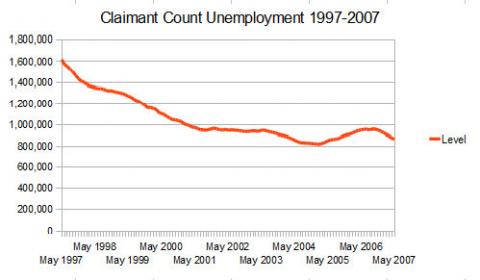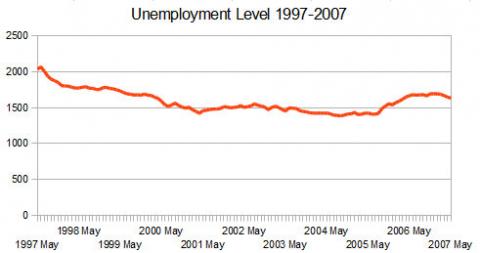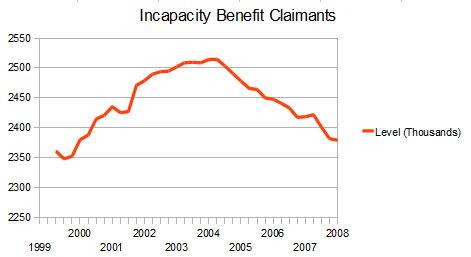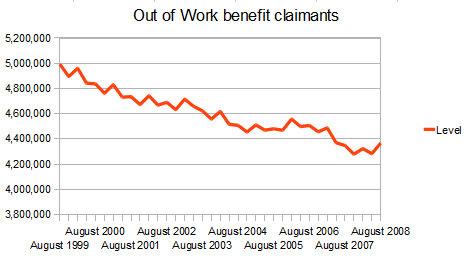Labour's record on welfare: Liam Byrne fact-check
"In the decade before the crash we halved unemployment and cut poverty and got the number of people on Incapacity Benefit falling and got employment up to a record high and the numbers on out of work benefits down by a million." Liam Byrne, Shadow Work and Pensions Secretary, Speech to IPPR, 9 February 2011
In his first major speech in his new job shadowing Iain Duncan Smith, Liam Byrne argued that the test of the Government's welfare reforms will be if they build on what he argued was the progress made under Labour.
But while the figures used to demonstrate this progress check out for the most part, there are some important details for each of the three claims.
Unemployment
Join 72,953 people who trust us to check the facts
Sign up to get weekly updates on politics, immigration, health and more.
Subscribe to weekly email newsletters from Full Fact for updates on politics, immigration, health and more. Our fact checks are free to read but not to produce, so you will also get occasional emails about fundraising and other ways you can help. You can unsubscribe at any time. For more information about how we use your data see our Privacy Policy.
As Full Fact found in an earlier factcheck of Gordon Brown this is only true if one looks at the claimant count of unemployment, essentially derived from the amount of people claiming unemployment benefit.
As the graph below, based on ONS figures, shows that taken this way it roughly checks out. When Labour came to office the figure stood at 1,619,600 and by May 2007 it had fallen to 870,800.

However this is not the measure that is used in the headline figure calculated by the Office for National Statistics each month. Rather than looking at Job Centre records for the number of claimants, it is based on the Labour Force Survey. (For more explanation of the reason for differences, see this very helpful article by the Office for National Statistics.)
As the graph shows while the level did decline, it did not fall by half. A similar story is true when looking at the unemployment rate which fell from 7.2 per cent in May 1997 to 5.4 per cent ten years later.

Of course, since the claimant count is a measure of unemployment there is no reason why Mr Byrne cannot use it — but it should be made clearer that this is not the measure most frequently cited.
Incapacity Benefit
Sadly, figures from the Department for Work and Pensions only go back to August 1999 making an analysis of Labour's first years in office difficult.
Keeping in mind this limitation it appears that if Labour did get the number of people falling, it wasn't by much.
Taking the figures from August 1999 until up to March 2008 (a proxy for the start of the recession), the number of people on the benefit was actually slightly higher, having remained within a range of 2.35 million and 2.5 million for most of the period.

In terms of the rate however, figures from the Nomis website suggest there was a small decline in the rate for Great Britain. from August 1999 to the beginning of the recession.
Out-of-Work Benefits
On Out of Work benefits, a term referring to claims for things such as Jobseekers Allowance, Incapacity Benefit, and Income Support, the numbers seems stronger.
The Nomis website keeps data on these benefits grouped together but again the data available to us only goes back to 1999. The figures also exclude Northern Ireland due to differences in the benefits system there.

There is a clear fall in the levels in the years going up to the start of the recession. However the fall is not in the region of the million claimed by Mr Byrne.
This of course could be explained by the by the missing two years of data. Indeed the fall seen in the claimant count in these years suggest that if we took data from 1997, a bigger fall would be recorded.
Given the different picture of the Job Seeker's Allowance and Incapacity Benefit, it is clear that the decline was far from uniform across the different types of benefit.
Conclusion
While there is nothing in Liam Byrne's statement that is out and out wrong, picking it apart reveals contention on almost every point.
Unemployment only halved when looking at a measure that is not the main definition of unemployment. The relatively small change in the numbers on incapacity benefit between 1999 and 2008 show that what fall there was on this front was relatively modest. Most of the decline in out of work benefit came from the reductions in job seekers allowance claims.
So it would unfair to say the statement is wrong, but there are significant other elements to the story that are left unsaid.